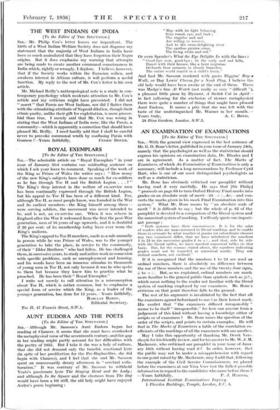THE WEST INDIANS OF - INDIA
[To the Editor of THE SPECTATOR.] Sra,—Mr. Philip Cox's letter leaves me impenitent. The birth of a West Indian Welfare Society does not disprove my statement that the majority of, West Indians in India have been so much assimilated that they have forgotten their Negro origins. But it does emphasise my warning that attempts are being made to create another communal consciousness in India which, rightly or wrongly, I deplore. I believe, however, that if the Society works within the Eurasian milieu, and awakens interest in African culture, it will perform a useful function. My reply to the rest of Mr. Cox's letter is his own article.
Mr. Michael Reilly's anthropological note is a study in con- temporary psychology which moderate attention to Mr. Cox's article and ins, criticism might hasie preVented. I did not " assert" that Parsis are West Indians, nor did I flatter them with the stimulating attribute of Negroid dilution, though their ethnic purity, unlike their gift for exploitation, is more prover- bial than true. I merely said that Mr. Cox was wrong in Stating that the West Indians of India were, like the Parsis, a community—which is apparently a correction that should have pleased Mr. Reilly. I need hardly add that I shall be careful never to provoke communal wrath by confusing Parsis with














































 Previous page
Previous page